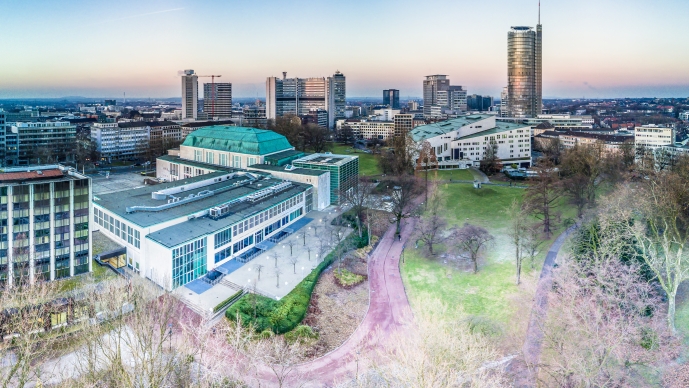Summer: University of Duisburg - Essen (Germany)
The Program
Learn about the transformation of contemporary societies, transnational social movements, transformation of work, global corporate elite and globalization in China. Take part in excursions to one of Europe’s largest steel plants and a variety of sights in the surroundings of Duisburg.
The University of Duisburg-Essen (UDE) is one of the largest universities in Germany with more than 40.000 students enrolled, offering a broad academic spectrum with numerous opportunities to participate in international programs. Global and Transnational Sociology at the University of Duisburg-Essen (UDE) is focused on broadening the sociological imagination beyond the national borders of most sociological theories and empirical data to generate new understandings of cross-border social interactions and interrelations. UDE’s Institute of Sociology (Campus Duisburg) includes a number of scholars engaged in studies of migration, work and employment, social structural change, comparative and transnational sociology. Professors teaching at the Summer School are also members of the Institute of Work, Skills and Training and the Institute of East Asian Studies in Duisburg.
Approved by Rutgers - School of Management and Labor Relations for LSER students. HRM students will also be considered.

Program Locations

Germany
Duisburg
Duisburg is “the city of water and fire” with Europe’s largest inner harbor and its famous steel production. Duisburg is located in the Ruhr Area, a diverse and vivid metropolitan area. More than 10% of Duisburg is forest area and with its six large lakes, Duisburg offers plenty of opportunities to relax and spend your free time outside.
Duisburg is a great starting point for travelling Germany and Europe. Düsseldorf and Cologne, two of Germany’s largest cities, can be reached within half an hour. Berlin is only 4 hours by train, Paris 5 hours and Amsterdam only 2 hours.
Academics
This Global and Transnational Sociology Summer School at University of Duisburg-Essen is open to both Undergraduate and Graduate LSER students (major and minor); HRM students will also be considered. Courses are taught in English for Bachelor of Arts (BA) and Master of Arts (MA) students; classes run Mondays through Thursdays, 10 am to 2pm.
Pre-approval through SMLR is suggested:
- LSER students should contact Akhila Naik
- HRM students should contact Rebecca Greenbaum
Summer 2025 course offerings include (you may choose one course per block). Visit the link to see all courses offered. The 2 courses listed below have been pre-approved for HRM and/or SMLR course numbers. Should you like to enroll in a different course, you will earn General Elective Credit.
|
Duisburg Course |
Undergraduate HRM |
Undergraduate LSER |
Master’s LER |
|
Transnational Environmental Sociology June 16-27, 2025 |
N/A – Not Approved |
Special Topics Elective 37:575:492 |
Special Topics Elective 38:578:610 |
|
Labor in a Globalized World: Labor Regulation in Multinational Companies June 30-July 11, 2025 |
Special Topics Elective 37:575:493 |
Special Topics Elective 37:575:493 |
Special Topics Elective 38:578:611 |
For information about study abroad credit transfer, registration, and transcripts please visit the Academics section of our website.
Housing and Meals
Students organize their accommodation individually. However, the Summer School Team is happy to help you with finding the right place for your stay in Duisburg. Housing (4 week stay) is approx. 500-800 €, and living expenses (4 week stay, depending on your lifestyle) is approx. 300 €.
Meals are offered in restaurants and cafeterias on campus -- a cup of coffee is approx. 2€, and a meal at the cafeteria is approx. 3€.
Student buddies may offer airport pick-up (when students fly into DUS airport).
Financial Information
Program Costs
| NJ Resident | non-NJ Resident | |
|---|---|---|
| Undergraduate (3 credits - 1 session) | $2,600 | $2,850 |
| Undergraduate (6 credits - 2 sessions) | $2,660 | $2,910 |
| Graduate (3 credits - 1 session) | $2,850 | $3,100 |
| Graduate (6 credits - 2 sessions) | $2,910 | $3,160 |
Program Cost includes:
- Tuition
- Administrative Fees
- Emergency Medical Access Abroad
Out-of-Pocket Costs
| Airfare | $1,200 |
| Housing (average: cost will vary by accommodation type) | $700 |
| Meals | $500 |
| Books and Classroom Materials | $50 |
| Local Transportation | $100 |
| Personal Expenses | $350 |
| Total | $2,900.00 |
Out-of-Pocket Cost includes:
The above costs are estimations and represent the known out-of-pocket costs students encounter during their time abroad.
Some of these expenses will be paid for prior to going abroad, such as an airline ticket and visa costs, while some of these expenses, such as meals and local transportation, will be paid in-country as part of your daily expenses. As you plan, you will need to budget these costs and spend wisely throughout your time abroad.
